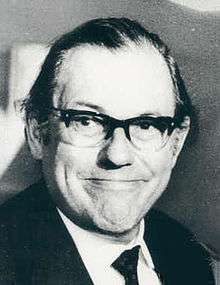Barnet (UK Parliament constituency)
| Barnet | |
|---|---|
|
Former County constituency for the House of Commons | |
| 1945–February 1974 | |
| Number of members | one |
| Replaced by | Chipping Barnet and South Hertfordshire |
| Created from | St Albans |
Barnet was a parliamentary constituency in what is now the London Borough of Barnet, which returned one Member of Parliament to the House of Commons of the Parliament of the United Kingdom.
History
The constituency was created for the 1945 general election, and abolished for the February 1974 general election.
Boundaries
1945-1950: The Urban Districts of Barnet and East Barnet, and the Rural District of Elstree.
1950-1955: The Urban Districts of Barnet and East Barnet, and the Rural Districts of Elstree and Hatfield.
1955-1974: As 1945.
The constituency was created in 1945 when the number of parliamentary constituencies in Hertfordshire was increased from five to six. Previously the area had been part of the St Albans seat. This was one of the English constituencies divided as an emergency measure, before the general review of parliamentary constituencies due later in the decade, because its electorate exceeded 100,000 voters.
In 1965 the Barnet and East Barnet urban districts were transferred to Greater London, becoming part of the London Borough of Barnet, while Elstree Rural District remained part of Hertfordshire. This did not affect parliamentary boundaries for nine years, however.
When seats were next redistributed, with effect from the February 1974 general election, the Greater London parts of the old constituency moved to the new seat of Chipping Barnet. The Elstree Rural District was transferred to South Hertfordshire.[1]
Members of Parliament
| Election | Member | Party | |
|---|---|---|---|
| 1945 | Stephen Taylor | Labour | |
| 1950 | Reginald Maudling | Conservative | |
| Feb 1974 | constituency abolished | ||
Elections
Election in the 1940s
| Party | Candidate | Votes | % | ± | |
|---|---|---|---|---|---|
| Labour | Stephen Taylor | 17,764 | 45.15 | N/A | |
| Conservative | A.E.J. Clarke | 17,082 | 43.42 | N/A | |
| Liberal | Jean Henderson | 4,495 | 11.43 | N/A | |
| Majority | 682 | 1.73 | |||
| Turnout | 39,341 | 73.76 | |||
| Labour hold | Swing | ||||
Elections in the 1950s
| Party | Candidate | Votes | % | ± | |
|---|---|---|---|---|---|
| Conservative | Reginald Maudling | 32,953 | 53.31 | +9.9 | |
| Labour | Stephen Taylor | 22,419 | 36.27 | -8.9 | |
| Liberal | William Herbert Jones | 6,441 | 10.42 | -1.0 | |
| Majority | 10,534 | 17.04 | |||
| Turnout | 61,813 | 87.45 | |||
| Conservative gain from Labour | Swing | +9.4 | |||
| Party | Candidate | Votes | % | ± | |
|---|---|---|---|---|---|
| Conservative | Reginald Maudling | 35,527 | 56.97 | ||
| Labour Co-op | Cyril Rawlett Fenton | 22,375 | 35.88 | ||
| Liberal | William Herbert Jones | 4,463 | 7.22 | ||
| Majority | 13,152 | 21.09 | |||
| Turnout | 62,365 | 85.89 | |||
| Conservative hold | Swing | ||||
| Party | Candidate | Votes | % | ± | |
|---|---|---|---|---|---|
| Conservative | Reginald Maudling | 30,299 | 60.76 | ||
| Labour | Sydney Hyam | 19,570 | 39.24 | ||
| Majority | 10,729 | 21.52 | |||
| Turnout | 49,869 | ||||
| Conservative hold | Swing | ||||
| Party | Candidate | Votes | % | ± | |
|---|---|---|---|---|---|
| Conservative | Reginald Maudling | 33,136 | 62.67 | ||
| Labour | Reginald M Prideaux | 19,737 | 37.33 | ||
| Majority | 13,399 | 25.34 | |||
| Turnout | 52,873 | ||||
| Conservative hold | Swing | ||||
Elections in the 1960s
| Party | Candidate | Votes | % | ± | |
|---|---|---|---|---|---|
| Conservative | Reginald Maudling | 25,537 | 48.43 | ||
| Labour | David H. P. Levy | 17,024 | 32.28 | ||
| Liberal | Hugh Russell Tinker | 10,172 | 19.29 | ||
| Majority | 8,513 | 16.15 | |||
| Turnout | 52,733 | ||||
| Conservative hold | Swing | ||||
| Party | Candidate | Votes | % | ± | |
|---|---|---|---|---|---|
| Conservative | Reginald Maudling | 24,833 | 47.1 | ||
| Labour | Geoffrey Hickman | 19,347 | 36.7 | ||
| Liberal | Hugh Russell Tinker | 8,539 | 16.2 | ||
| Majority | 5,486 | 10.4 | |||
| Turnout | 52,719 | ||||
| Conservative hold | Swing | ||||
Election in the 1970s

| Party | Candidate | Votes | % | ± | |
|---|---|---|---|---|---|
| Conservative | Reginald Maudling | 26,845 | 52.29 | ||
| Labour | Joan E. M. Baker | 18,166 | 35.38 | ||
| Liberal | John D. O. Henchley | 6,329 | 12.33 | ||
| Majority | 8,679 | 16.91 | |||
| Turnout | 51,340 | ||||
| Conservative hold | Swing | ||||
References and sources
- References
- Sources
- Boundaries of Parliamentary Constituencies 1885-1972, compiled and edited by F.W.S. Craig (Parliamentary Reference Publications 1972)
- Leigh Rayment's Historical List of MPs – Constituencies beginning with "B" (part 1)
| Parliament of the United Kingdom | ||
|---|---|---|
| Preceded by Wirral |
Constituency represented by the Chancellor of the Exchequer 1962–1964 |
Succeeded by Cardiff South East |